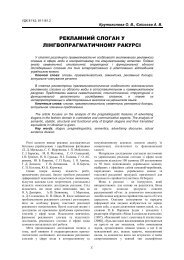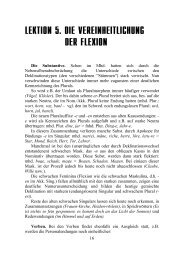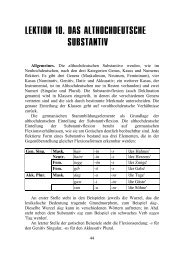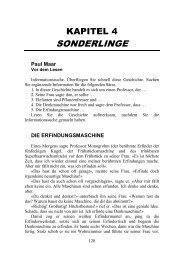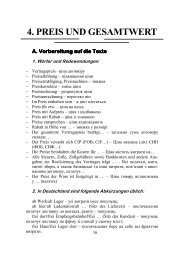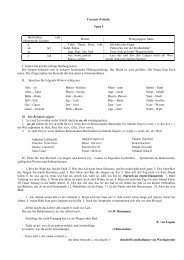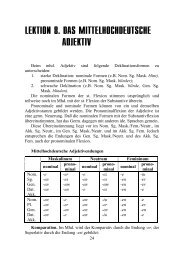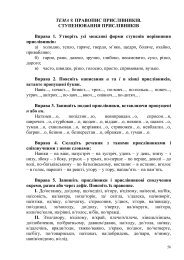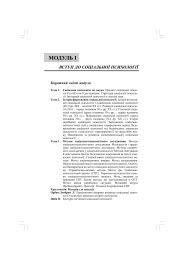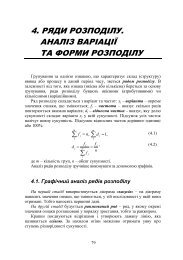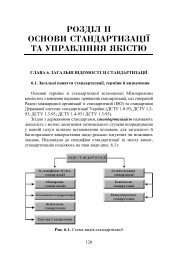units of international lexicon and ways of rendering their meaning ...
units of international lexicon and ways of rendering their meaning ...
units of international lexicon and ways of rendering their meaning ...
Create successful ePaper yourself
Turn your PDF publications into a flip-book with our unique Google optimized e-Paper software.
UNITS OF INTERNATIONAL LEXICON<br />
AND WAYS OF RENDERING THEIR<br />
MEANING AND LINGUAL FORM<br />
Internationalisms are such language <strong>units</strong> which are borrowed from one<br />
<strong>and</strong> the same source language by at least three genealogically different languages<br />
in the same or similar lingual form <strong>and</strong> identical <strong>meaning</strong> (cf. долар, атом,<br />
інтерес, директор, база, стадіон, театр, фізика, etc.). International may<br />
be not only words <strong>and</strong> phrases/word-groups, but also morphemes – prefixes,<br />
suffixes <strong>and</strong> even inflexions.<br />
Among the most <strong>of</strong>ten occurring <strong>international</strong> affixes in English <strong>and</strong><br />
Ukrainian are the following:<br />
1) prefixes: аnti-/анти-, ех-/екс-, inter-/iнтep-, trans-/транс-, ultrа-/<br />
ультра- as in antibody – антитіло, export (v.) – експортувати, <strong>international</strong> –<br />
інтернаціональний, ultraviolet – ультрафіолетовий.<br />
2) suffixes: -ar/-ap, -er/-ep, -ist/-ист/-icт, -ssion/-ciя, -tion/-ція, etc.<br />
as in actor/актор, volunteer/волонтер, humanist/гуманіст, constitution/<br />
конституція, aggression/агресія, humorist/гуморист, etc.<br />
3) inflexions: -um/-ум, (memor<strong>and</strong>um/меморандум), -us/-yc, (radius/<br />
радіус), -а/-а (formula/формула), etc.<br />
The bulk <strong>of</strong> these borrowed morphemes, lexemes <strong>and</strong> syntaxymes are found<br />
in many languages <strong>of</strong> a culturally, historically, <strong>and</strong> <strong>of</strong>ten geographically<br />
common area as Europe, the Middle East or the Far East. They are used to<br />
designate notions belonging to different domains <strong>of</strong> human knowledge or<br />
activity.<br />
Hence, there is distinguished:<br />
a) the social <strong>and</strong> political terminology comprising the most commonly<br />
used political, economic, philosophical, historical, sociological <strong>units</strong> <strong>of</strong> <strong>lexicon</strong><br />
(audit, bank, constitution, parliament, party, president, barter, sophism,<br />
etc.). Here also belong terms designating <strong>international</strong> law, diplomacy, literary<br />
terms (drama, poet, metaphor, epithet, hyperbole, etc.);<br />
b) natural history/sciences terminology (physics, mathematics, genetics,<br />
chemistry) used not only in special but also in scientific <strong>and</strong> popular works<br />
<strong>and</strong> in mass media (chemical/physical reaction, genes, pneumonia, etc.);
38<br />
Кузенко Г.М.<br />
c) numerous technical terms (names <strong>of</strong> machines <strong>and</strong> <strong>their</strong> parts: motor,<br />
carter, starter, accelerator, battery), as well as names <strong>of</strong> different means <strong>of</strong><br />
transport (bus, metro, taxi) <strong>and</strong> communication (fax, telegraph, telex, radio,<br />
e-mail), etc.<br />
These <strong>and</strong> other words <strong>and</strong> phrases <strong>of</strong> the kind are referred to as<br />
<strong>international</strong>isms, or more precisely genuine <strong>international</strong>isms. Their main<br />
characteristic feature is semantic singularity. It means that <strong>their</strong> lexical<br />
identity <strong>and</strong> orthographic similarity in the source language <strong>and</strong> in all target<br />
languages remains unchanged both at language level (when taken separate)<br />
<strong>and</strong> at speech level, i.e., when used in texts/speech.<br />
Apart from genuine <strong>international</strong>isms there exists one more group <strong>of</strong><br />
<strong>international</strong> lexis called translation loan <strong>units</strong> <strong>of</strong> <strong>lexicon</strong>. These have<br />
also a generally common structural form (<strong>of</strong> word, word-combination) but<br />
rarely a similarity in <strong>their</strong> orthographic form or sounding. Loan <strong>international</strong>isms<br />
are mostly different terms designating scientific <strong>and</strong> technological notions:<br />
citric aid – лимонна кислота, surplus value – додана вартість, agreement –<br />
узгодження, etc.<br />
Along with these two groups <strong>of</strong> word <strong>international</strong>isms there also exist<br />
many stable <strong>international</strong> phraseological/idiomatic expressions in each<br />
language’s <strong>lexicon</strong>. Their fund is constituted by the so-called absolute <strong>and</strong><br />
near equivalents having a common language <strong>of</strong> origin – Greek, Latin or<br />
modern: Heel <strong>of</strong> Achilles – ахіллесова п’ята; to cross/pass the Rubicon –<br />
перейти Рубікон; the die is cast – жереб кинуто; after us the deluge – після<br />
нас хоч потоп; the fair sex – прекрасна стать; the tree <strong>of</strong> knowledge –<br />
дерево пізнання, etc.<br />
A separate subgroup <strong>of</strong> genuine <strong>international</strong>isms constitute proverbs,<br />
sayings <strong>and</strong> set expressions which are used in <strong>their</strong> foreign/original lingual<br />
form (they are predominantly <strong>of</strong> Latin, French, English, German origin):<br />
status in statu – держава у державі; repetitio est mater studiorum (Lat.) –<br />
повторення – мати навчання; finita la commedia (Ital.) – настав<br />
кінець, крах (справі кінець); da ist der Hund begraben! (Germ.) – ось де<br />
собака закопаний!; O.K., all right (Engl.) – усе гаразд; c’est la vie (Fr.) –<br />
таке життя.<br />
Identification <strong>of</strong> International Lexicon Units<br />
The <strong>units</strong> <strong>of</strong> genuine <strong>international</strong> <strong>lexicon</strong> are identified on the basis <strong>of</strong><br />
<strong>their</strong> common in different languages lexical <strong>meaning</strong> <strong>and</strong> identical or only<br />
similar lingual form. Loan <strong>international</strong>isms, on the other h<strong>and</strong>, are<br />
identified mainly on the basis <strong>of</strong> <strong>their</strong> common sphere <strong>of</strong> use, <strong>their</strong> lexical<br />
<strong>meaning</strong>, functional significance <strong>and</strong> partly – structural form.
Навчальний посібник з курсу “Теорія та практика перекладу”<br />
“THE WORLD OF INTERPRETING AND TRANSLATING ”<br />
Internationalisms are characterized by a similarity <strong>of</strong> <strong>their</strong> lexical <strong>meaning</strong>,<br />
by an identity or similarity in <strong>their</strong> orthographic <strong>and</strong> sounding form, by<br />
<strong>their</strong> denotative <strong>meaning</strong> <strong>and</strong> sometimes by <strong>their</strong> motivation. Their <strong>meaning</strong><br />
does not change in any contextual environment.<br />
The identification <strong>of</strong> the <strong>international</strong> <strong>meaning</strong> <strong>of</strong> some lexemes becomes<br />
much more difficult when dealing with polysemantic language signs. That<br />
is because in English a lot <strong>of</strong> lexemes may <strong>of</strong>ten have one <strong>and</strong> the same<br />
lingual form for several notions, as, for example, in the noun conductor:<br />
Conductor<br />
кондуктор – genuine <strong>international</strong>ism<br />
провідник – <strong>international</strong> loan word<br />
провід – <strong>international</strong> loan word<br />
громовідвід – <strong>international</strong> loan word<br />
диригент – pseudo-<strong>international</strong>ism<br />
керівник – pseudo-<strong>international</strong>ism<br />
Apart from the polysemantic words with several <strong>meaning</strong>s, one <strong>of</strong> which is<br />
genuine <strong>international</strong> <strong>and</strong> the rest pseudo-<strong>international</strong>, i.e., non-<strong>international</strong>,<br />
there are also quite a few words in present-day English <strong>and</strong> Ukrainian which<br />
have an identical orthographic form but quite different lexical <strong>meaning</strong>:<br />
accurate – точний, правильний but not акуратний; data – дані but not<br />
дата; intelligence – розум but not інтелігенція; matrass – колба but not<br />
матрац; obligation – зобов’язання but not облігація; prospect – перспектива<br />
but not проспект; replica – точна копія but not репліка, etc.<br />
These <strong>and</strong> the like pseudo-<strong>international</strong> words are <strong>of</strong>ten referred to as<br />
‘false friends <strong>of</strong> the translator’ (удавані друзі перекладача).<br />
39



